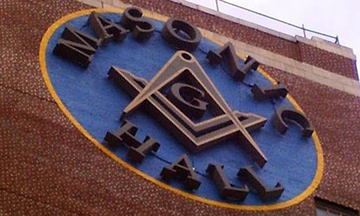
Masonic lodges are a fixture of social life in many towns and cities around South Carolina. Shriners collect money for charity and often appear in parades and other events. Many cars and trucks sport stickers, decals and insignia of various Masonic groups.
If any of those items are displayed on a car parked outside a Catholic church, however, there is a problem.
Catholics, according to church teaching, can’t be Masons because of serious disagreements over theology and the role of God’s revelation in faith.
It’s a fact that many Catholics might not be aware of because the Masons are such an integral part of community life in many places.
Father Edward W. Fitzgerald, pastor of Divine Redeemer Church in Hanahan, said he was recently asked by parishioners if Catholics could be Masons and still be in good standing with the church, or belong to the Masons and still serve as extraordinary ministers of Holy Communion.
“There’s a lot of confusion out there about the issue,” he said.
The Sacred Congregation of the Faith weighed in with a binding statement in 1983, stating that membership in a Masonic organization was forbidden “since their principles have always been considered irreconcilable with the doctrine of the Church … The faithful who enroll in Masonic organizations are in a state of grave sin and may not receive Holy Communion.” The statement was signed by Cardinal Joseph Ratzinger, who led the Congregation before becoming Pope Benedict XVI.
Central to the church’s objection is the Masons’ focus on belief in a deity they refer to as “Architect of the Universe,” the brotherhood of mankind and immortality of the soul. Masonic tradition stresses these beliefs can be discovered solely through human reason, without relying on revelation through Scripture or the sacraments. Individual Masons are encouraged to keep their own religious backgrounds to themselves while practicing Masonic rituals, which have their own rigid rules of secrecy and symbolism.
A 1985 article in L’Osservatore Romano clarified the church’s position: “In any case, for a Catholic Christian, it is not possible to live his relation with God in a twofold mode … He cannot cultivate relations of two types with God, nor express his relation with the Creator through symbolic forms of two types.”
Church teaching does not condemn Catholic individuals who may join a Masonic lodge in error or the Masons as human beings, said David Williams, chairman of the theology department at Belmont Abbey College in North Carolina.
“Although individual Masons are often excellent people, and particular Masonic lodges no more than charitable fraternal groups, there are serious issues with the thought and philosophy underlying Freemasonry as a movement,” Williams said. “…If you take Masonic principles fully seriously, they don’t leave room for revealed religion. Their rational philosophic approach to God doesn’t really leave room for faith and revelation.
“I think it’s important to get across that it’s not a judgment on individuals or even the practical reality of the Mason lodge down the street. It’s about the broader principles and origins of the Masonic ritual,” he continued.
Williams said earlier church opposition to Catholics being Masons stemmed from blatant anti-Catholic tendencies in some strains of Freemasonry, especially in Europe. The current ban against Catholic membership is instead based on theological differences.
